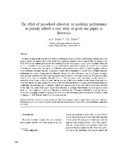| dc.contributor.author | Taiwo, A.A. | |
| dc.contributor.author | Tyolo, J.B. | |
| dc.date.accessioned | 2011-03-04T12:41:22Z | |
| dc.date.available | 2011-03-04T12:41:22Z | |
| dc.date.issued | 2002-01-08 | |
| dc.identifier.citation | Taiwo, A.A. & Tyolo, J.B. (2002) The effect of pre-school education on academic performance in primary school: a case study of grade one pupils in Botswana, International Journal of Educational Development, Vol. 22, No. 2, pp. 169-180 | en_US |
| dc.identifier.issn | 0738-0593 | |
| dc.identifier.uri | http://hdl.handle.net/10311/722 | |
| dc.description.abstract | Evidence abounds in the literature of a direct link between pre-primary education and academic performance in the primary school. The salutary effect of the ‘Head start’ programme inaugurated in the United States of America in the early 1960s on the academic performances of its beneficiaries in the lower primary is such a piece of evidence. Premised on this commonality between pre-primary education and academic achievement in the primary school, the study aimed at finding out whether there were significant differences in the performances of Botswana grade one pupils with preschool education experience and their counterparts without such an experience on selected tasks in English language, mathematics and science. Using purposive sampling technique for school selection, a total of 120 grade one pupils were randomly selected for the study from four selected primary schools in Botswana. In addition, 20 grade one teachers from the study schools participated in the study. For data collection purpose, each pupil-subject was individually interviewed for about 20 min on the study tasks; and the opinions of the twenty teachers on the subject of the study was sampled by the use of a questionnaire. The results of the study indicated that pupils with pre-school education experience significantly out-performed their counterparts without such experience in all the three school subject areas surveyed by the study. This trend of the impact of pre-school education on academic achievement at the early primary school level was corroborated by the opinions of the primary school teachers. The paper concluded by observing that preschool education equips children with pre-requisite skills which make learning in grade one easier and faster for children so exposed. | en_US |
| dc.language.iso | en | en_US |
| dc.publisher | Elsevier, http://www.elsevier.com/wps/find/homepage.cws_home | en_US |
| dc.subject | Pre-school education | en_US |
| dc.subject | Academic performance | en_US |
| dc.subject | Pre-school experience | en_US |
| dc.subject | Grade one pupils | en_US |
| dc.subject | Impact of pre-school education | en_US |
| dc.subject | Pre-requisites skills | en_US |
| dc.subject | New entrants into primary schools | en_US |
| dc.subject | Early childhood programme | en_US |
| dc.subject | Selected tasks in english language, mathematics and science | en_US |
| dc.title | The effect of pre-school education on academic performance in primary school: a case study of grade one pupils in Botswana | en_US |
| dc.type | Published Article | en_US |
| dc.link | http://www.sciencedirect.com/science/article/B6VD7-44W2PR8-6/2/bd78dddfaf6c03655c219c1400b41f16 | en_US |

